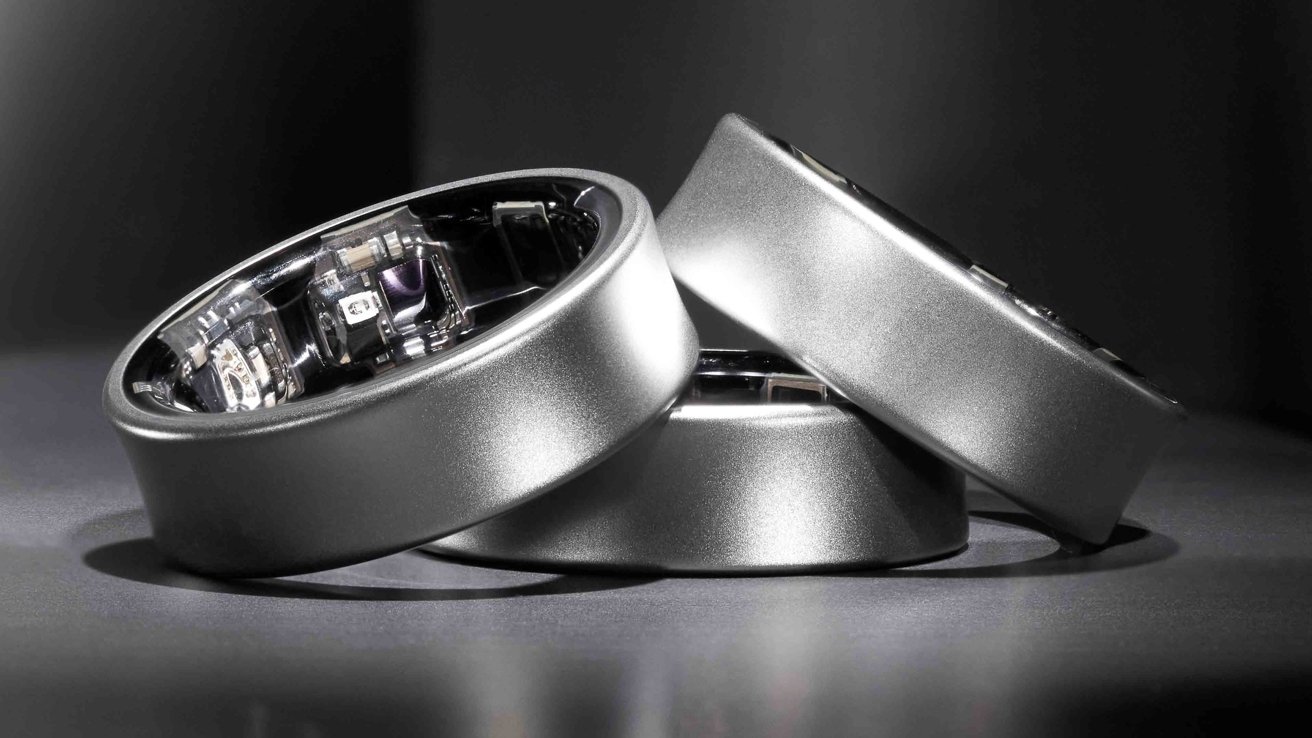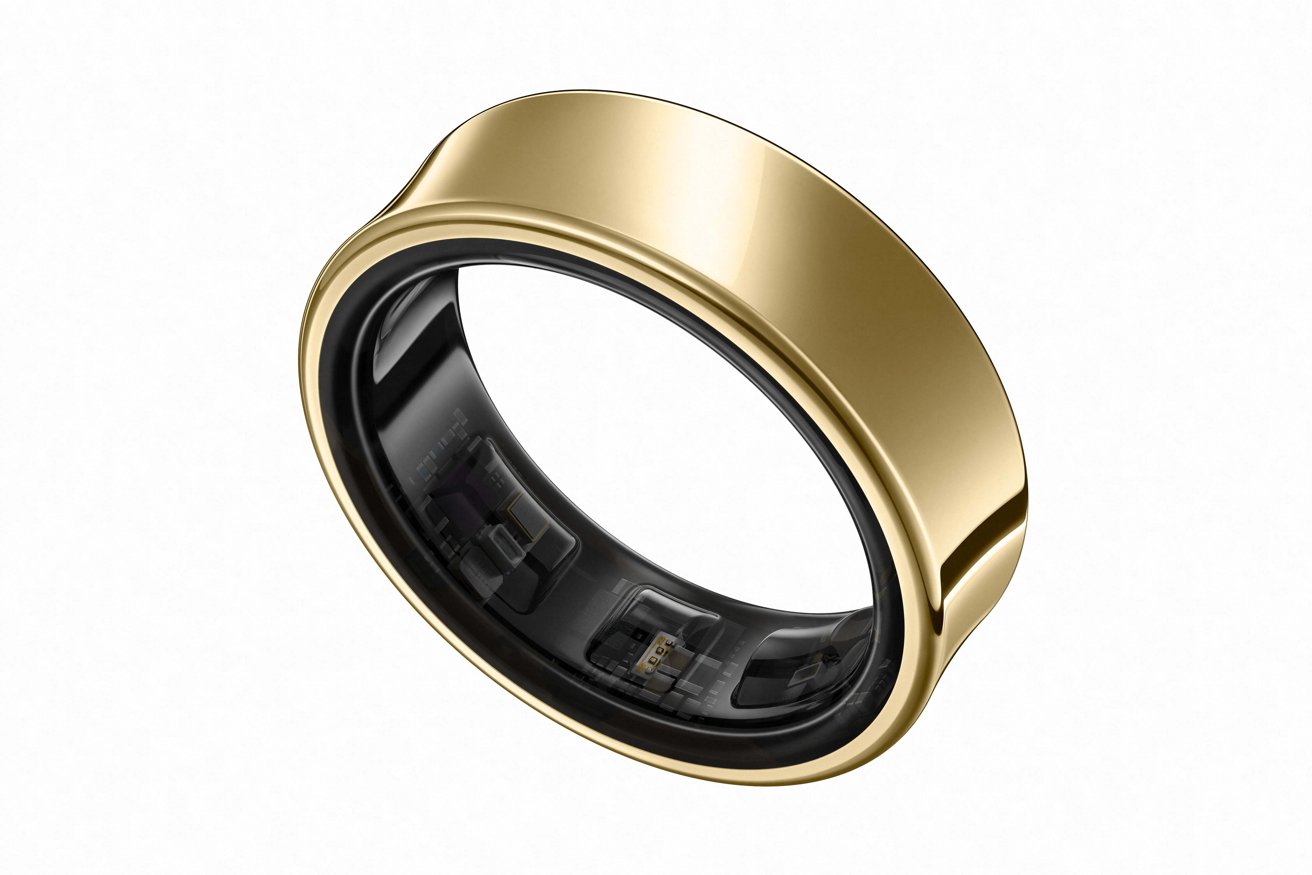Samsung has finally launched its Galaxy Ring, but the rival wearable is unlikely to cause problems for the long-rumored Apple Ring.
The Galaxy Unpacked event on July 10 had Samsung unveil a number of products. Its big launch is an entirely new category for Samsung, one it previously teased it was going to introduce.
The Galaxy Ring is, as the name implies, a smart ring, Much like a smartwatch can be worn on a wrist and offer the user information about their fitness and health, a smart ring can do the same thing in a much more confined format.
On the outside it looks like a normal ring, but inside is a layer of sensors used to monitor the user's vitals. Weighing between 2.3 grams and 3.0 grams depending on size and material, it has a stylish concave design and with a Titanium grade 5 finish for durability.
Samsung says that its ring can withstand 10 atmospheres of pressure, and has an IP68 water and dust resistance rating. Battery life is up to seven days using its 18mAh battery and a 361mAh charging case.
Inside, there is a photoplethysmogram (PPG) sensor to monitor blood volume changes in the finger, for detecting heart rates. A skin temperature sensor is also included, as well as an accelerometer.
The trio of sensors can be used for automatic workout detection, live heart rate checks, heart rate alerts, and sleep tracking. Handled through the Samsung Health platform, it can perform sleep analysis using an AI algorithm to monitor sleep patterns and offer to improve resting habits.
The ring can also provide daily fitness reminders with Inactive Alerts. Cycle Tracking is also provided, using the skin temperature to monitor changes overnight.
Galaxy AI will generate a health report that includes a user's health metrics. Part of this will be an Energy Score, which will offer recommendations based on a user's physical state.
Since the ring doesn't have its own display, it does link up to a smartphone, which it connects to over Bluetooth 5.4. Apple users won't be able to try out the Galaxy Ring for themselves on the iPhone, as it will only be compatible with Android devices.
Outside of health benefits, the Galaxy Ring can help users interface with Galaxy smartphones. Gesture support is offered, with double pinches able to dismiss alarms or take a photo.
There's also Find My Ring, a feature within Samsung Find that helps users know where they last used the wearable.
The Samsung Galaxy Ring is available to preorder in select markets now, and will ship from July 24 priced from $399. It will be available in ring sizes from 5 to 13, and will be offered in Titanium Black, Titanium Silver, and Titanium Gold.
First-mover advantage, but still to face Apple Ring
Samsung's introduction of the Galaxy Ring may have some people considering it to be a problem for the Apple Ring. The Cupertino tech giant's often-rumored attempt on the concept has been talked about for almost two decades.
This has included a lot of speculation from observers, rumors, and lots of patent filings on the concept. The patent evidence and ongoing sentiment is that some form of Apple Ring wearable is actually on the way.
With Samsung entering the smart ring market before Apple, observers could think that Samsung has the first-mover advantage. That is, if you ignore the existence of Oura.
However, it's doubtful that the Galaxy Ring will cause any problem for the Apple Ring, if it actually does see a release.
For a start, Samsung beating Apple to the punch on hardware releases doesn't have as much of an impact than you might think. For this, consider the Apple Watch, which was released in September 2014.
Samsung had an initial September 2013 launch of the Galaxy Gear smart watch. A year is a very long time in tech, and that was thought to be a big advantage for Samsung at the time.
However, it did nothing to dent Apple's launch and subsequent domination of the smartwatch marketplace.
By 2023, a report said that the Apple Watch accounted for 34.1% of all smartwatch shipments in 2022. Apple Watch also took in 60% of the market's revenue.
Samsung was in second place. At the time, it held a mere 9.8% of the market, despite increasing 12% year-on-year.
There is also the problem of ecosystem adherence, with iPhone users tending to buy the Apple Watch over others and Android users doing likewise. You could probably expect that ring sales will follow the same sort of ecosystem lines.
Since the Apple Ring doesn't exist outside of Apple's labs at the moment, it's too early to tell with certainty how the market will play out this time. But the writing is on the wall.
Samsung certainly does have an advantage for the moment by having an actual product for sale. But it's probable that the Apple Ring will follow in the Apple Watch footsteps and quickly take over the market.

